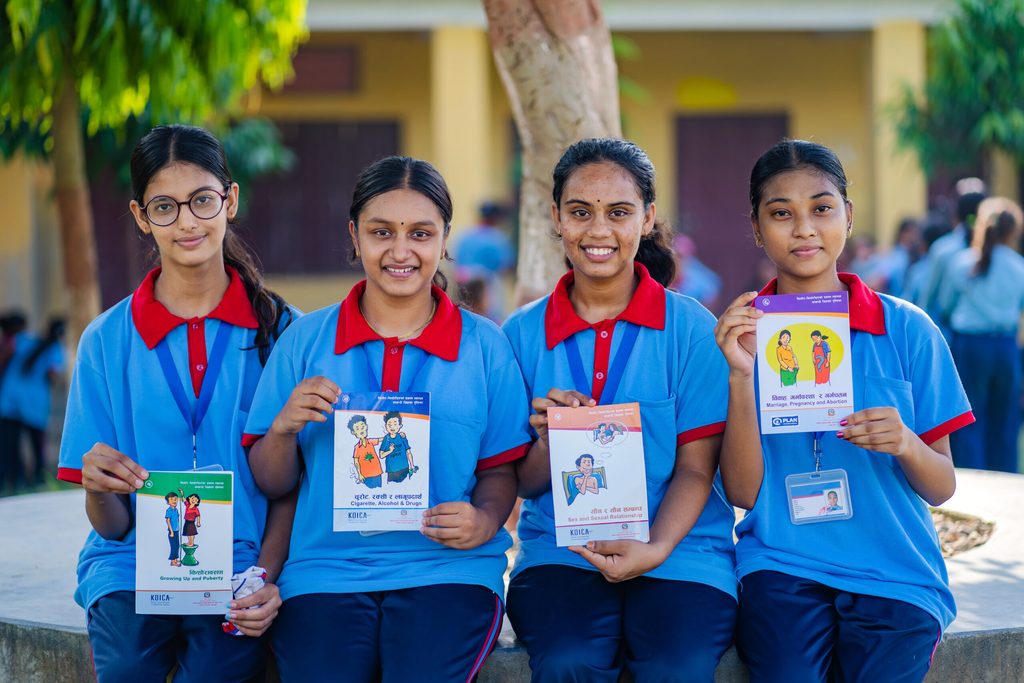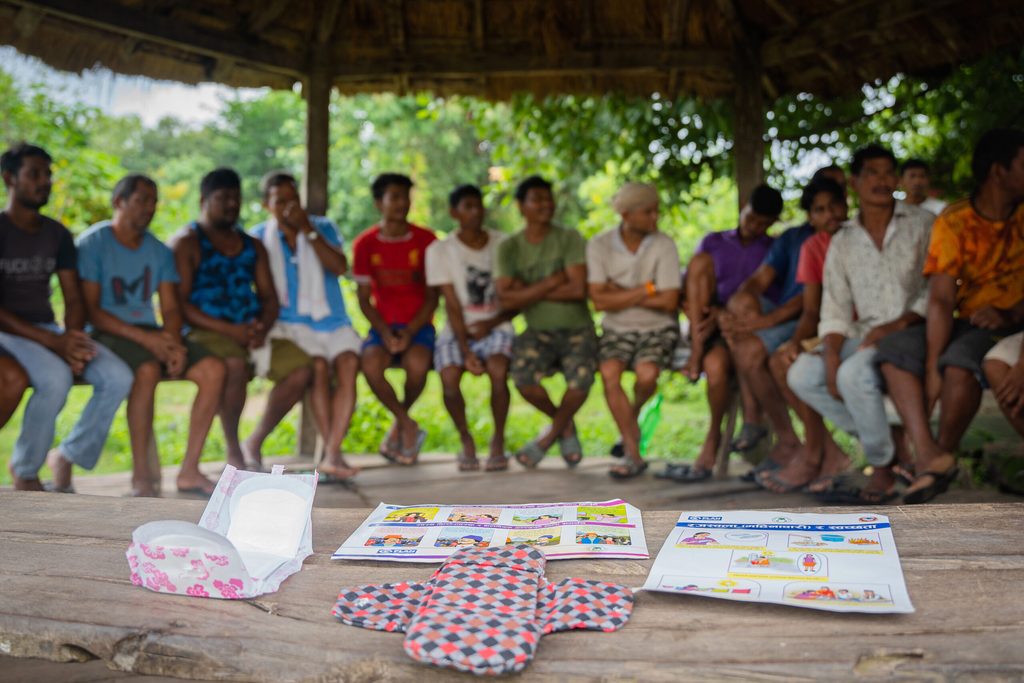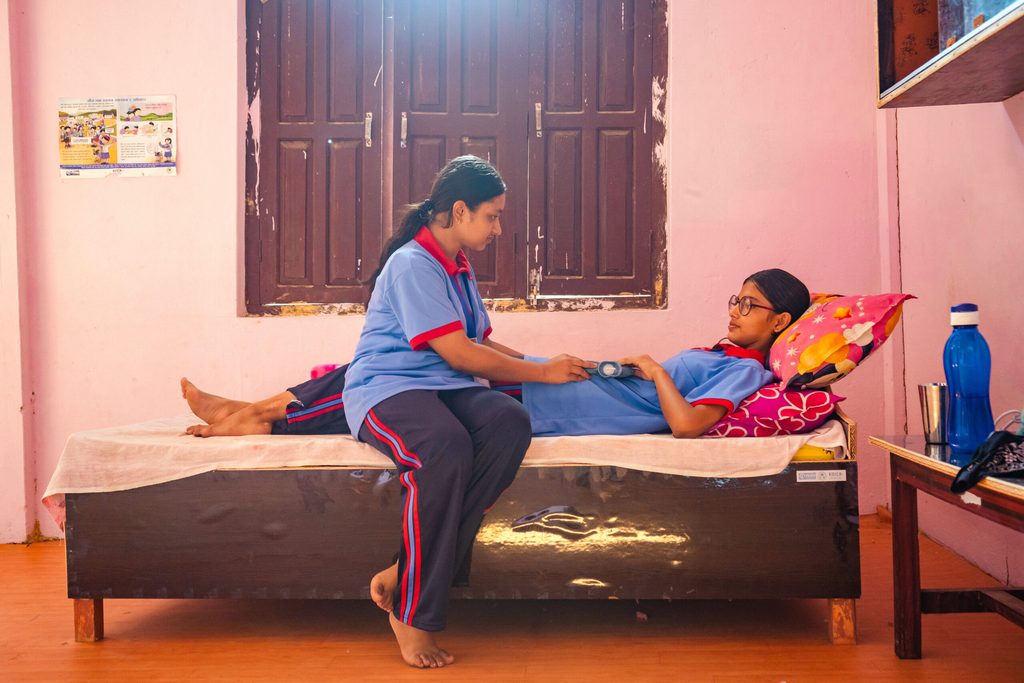Radhika fights against menstrual taboos in her community
After learning about menstruation, Radhika is supporting other girls to manage their periods.
Breaking taboos and empowering Nepali adolescents through open conversations and comprehensive education, the Plan International Nepal-led project in Bardiya is fostering positive change in sexual and reproductive health.
In the heart of Bardiya district, a transformative initiative is unfolding, breaking barriers and fostering open conversations on sexual and reproductive health and rights (SRHR). Plan International Nepal’s three-year Adolescent Sexual and Reproductive Health and Rights Project (2021-2023) is educating adolescents and parents, training teachers, and building infrastructure to create a safe and supportive environment for girls, both at home and in school during menstruation.

At a local school, a group of young students regularly convene at their adolescent club, defying the conservative societal norms that often shroud these topics in secrecy. Here, young minds are encouraged not only to speak openly about sexual and reproductive health but also to learn about their rights and how to exercise them.
“I now know the importance of using condoms for safe sexual relationships.”
Riya, 15
“I learned that unprotected sex and becoming pregnant at an early age poses risks to both mother and child. I now know the importance of using condoms for safe sexual relationships,” says Riya.
Riya, a 15-year-old participant, attests to the impact of the club on her life. She emphasises how the club has equipped her with knowledge about her rights, including the right to say no to early marriage and unwanted advances. Riya acknowledges the importance of safe sexual relationships, highlighting the significance of using condoms. The club members, having gained essential skills, serve as peer educators, spreading awareness and organising activities to educate their peers.
As part of the initiative led by Plan International, teachers are receiving comprehensive training in sexuality education. Shanta, a teacher and menstrual health focal point at a local school, notes the shift in approach. Formerly hesitant to broach sexual and reproductive health topics in class, teachers now find it easier to engage students in open conversations. Shanta highlights the impact of these discussions, reducing the likelihood of early marriages among teenagers.
“Now, we can teach SRHR topics with ease.”
Shanta, SRHR teacher
Shanta expresses, “In the past, we couldn’t openly discuss sexual and reproductive health in our classes. There was hesitation to discuss such topics. We used to ask students to read about these topics themselves. However, this has changed after we attended the training.”
“Now, our students feel comfortable to have open conversations on sexual and reproductive health with us. We can teach SRHR topics with ease. When teenagers can engage in discussions about reproductive health, it reduces the likelihood of early marriages.”
Recognising the importance of involving parents and caregivers, the project extends its reach to fathers’ groups. These groups aim to engage men in their daughters’ reproductive health. Members like Om challenge age-old traditions, fostering open communication and support. By dispelling myths around menstruation, fathers contribute to changing deeply embedded cultural norms.

“I tell my daughter that menstruation is a normal phenomenon. It happens to everyone,” says fathers’ group member Om from Thakurbaba municipality. “If she needs pads or anything else, she knows she can tell her father. Since I am outside the home most of the time, I can bring her all the necessary items. I ensure that she has nutritious food such as eggs, cashews, almonds, or whatever I can provide for her.”
Om says that his parent’s generation still follows the practice of ‘untouchability’ – a tradition also known as Chhaupadi, whereby menstruating women and girls are exiled to a shed and forbidden from touching other people and objects.
“This needs to be changed, we are working towards making this change,” says Om. “When we have open and friendly communication with our children, they are unlikely to enter into early marriages. If we don’t take care of our children and put pressure on them, they are likely to enter into an early marriage.”
The project’s three-year mission encompasses not only knowledge dissemination but also practical support. To overcome hurdles faced by adolescents in accessing sexual and reproductive health services, the initiative focuses on strengthening school-based services. This includes the construction of gender-friendly toilets and washing facilities, as well as the creation of menstrual health management restrooms, ensuring a supportive environment for adolescent girls.
One significant aspect of the initiative is the creation of menstrual health management restrooms. These designated spaces not only provide comfort and support for girls experiencing their period but also contribute to reducing the stigma associated with menstruation. Addressing the alarming statistic that 1 in 4 girls in Nepal skip school during their period, these initiatives aim to foster better education and health outcomes for young girls.

“In the past, our approach was solely centered around the distribution of sanitary pads. However, this has evolved. Now, we provide sanitary pads to those menstruating and have a designated space for menstrual health management,” explains Shanta. “Now, if a student is menstruating at school, they can comfortably visit the menstrual health room to rest before returning to their classes.”
“Before the menstrual health rooms were set up, we had to rush home when we got our periods,” says 14-year-old Pratima. “Now, Plan International has built menstruation restrooms here so whenever we have stomach aches, we can go there and use hot water bottles to ease our pains. They also provide us with pads. Now, even if our clothes get stained with blood, we have somewhere we can get changed.”
Through the collaborative efforts of organisations like Plan International, Nepal is witnessing a positive transformation in the discourse around sexual and reproductive health. By empowering adolescents with knowledge, engaging teachers in comprehensive education, involving parents in supportive conversations, and providing essential infrastructure, this initiative is breaking taboos and paving the way for a healthier, more informed generation. As the project continues to unfold, its impact promises to extend far beyond the school walls, influencing societal attitudes and contributing to lasting change.
The three-year Adolescent Sexual and Reproductive Health and Rights Project (2021-2023) works across 4 municipalities in the Bardiya district. Funded by the Korea International Cooperation Agency and in partnership with the Geruwa Rural Awareness Association, the project aims to improve adolescent access to crucial SRHR information.
The project focuses on strengthening school-based sexual and reproductive health services through infrastructure support, including the construction of gender-friendly toilets and water, sanitation, and hygiene facilities. In addition, menstrual health management restrooms have been created to ensure a supportive environment for adolescent girls experiencing their period.
By numbers:
• 24 gender and disability-friendly toilets have been constructed in schools
• 9 handwashing facilities have been built
• Repairs and maintenance were carried out on 7 toilet facilities
• Menstrual health management rooms and adolescent-friendly information corners have been established in 36 schools
• 1,538 adolescents have been provided with peer education training on sexual and reproductive health and rights
• 141 teachers received 5 days of training in comprehensive sexuality education
• 3,523 men have taken part in fathers’ group meetings